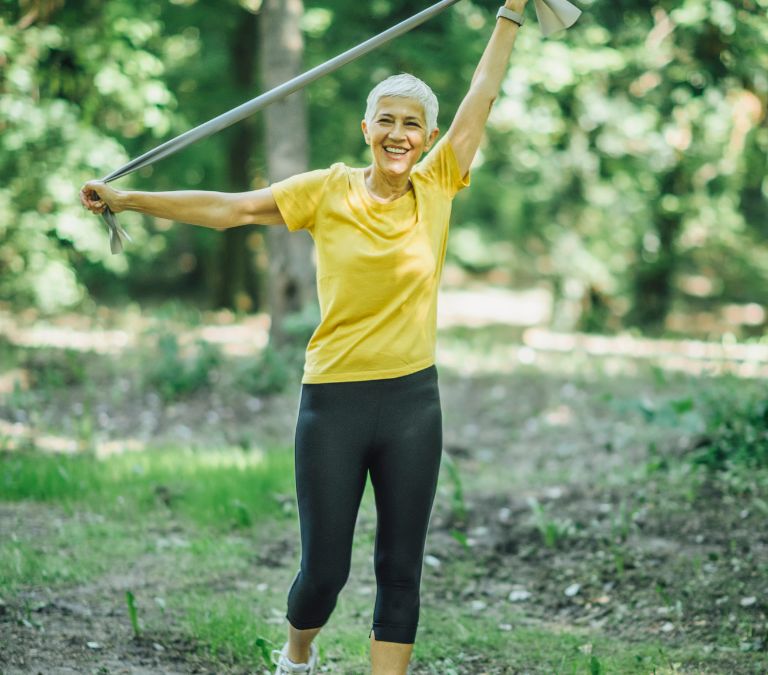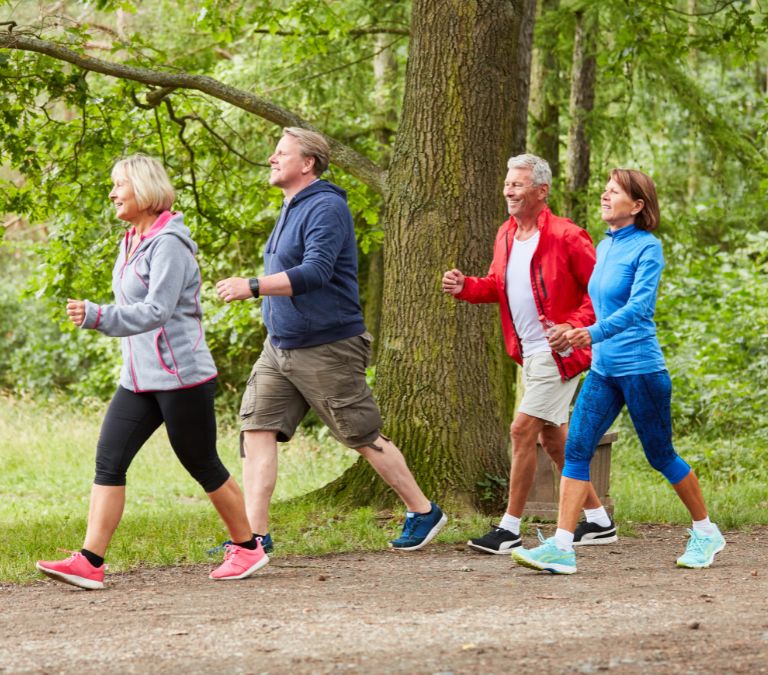As women approach menopause, a lot of their body hormones would naturally decrease; majorly estrogen and progesterone. Many experts recommend hormonal supplements, but doing something as little as taking a walk can help reduce menopausal symptoms.
Aside from the physical and mental benefits of regular exercise, the rush of adrenaline you’ll get when you exercise can be very beneficial, especially for women dealing with menopausal symptoms.
Women who are going through menopausal transition likely experience joint aches or pains. The issue is further compounded if you’ve added a little weight during your transitioning. As a result, women don’t have the strength to take a walk or even visit the gym.
Walking has so many benefits; a person suffering from depression or mania could take a ten-minute walk around the block, and by the time they get back, they’ve cleared their head of the trauma plaguing them. Now imagine how such walks could help reduce your menopausal symptoms.
Walking will help improve common menopausal symptoms like cardiovascular risk, mood swings, and self-esteem. Menopausal symptoms aren’t meant to be an eternal cross; you can greatly reduce their effects by walking daily. This article provides you with a brief overview of some of the ways walking helps reduce menopausal symptoms.
Benefits Walking Has on Menopausal Symptoms

- It Helps Cut Down Weight Gained during Menopause
One of the most common menopausal symptoms is weight gain. Once you start transitioning into the menopause phase, you’ll inevitably gain some weight. However, the weight each woman gains during menopause varies depending on their level of activity and exercise.
A woman who sits at home all day would gain much more weight than one who takes daily walks. During menopause, weight gain is inevitable, but you can steadily reverse the process by living an active lifestyle.
Common growth areas include your hips, thighs, and abdomen. The more food you eat, the higher the number of calories stored in your body. If your body has a slow metabolism, you’ll burn calories slower, leading to accumulated fat in the body. However, with a faster metabolism, you’ll quickly burn calories as fast as you take them in.
Exercise is one of the easiest ways to increase your metabolism. Because you’re aging, the rate at which you naturally burn calories will inevitably reduce even if you start with a fast metabolism.
According to Dr. Chih-Hao Lee, a professor of genetics and complex diseases at Harvard’s T.H. Chan School of Public Health, you can’t entirely blame a slow metabolism for weight gain. Inactivity also plays a major role, coupled with a bad diet. Therefore, if you remain active by walking daily, you can easily manage weight gain during menopause.
- It Helps to Reduce Stress and Depression
As your hormones begin to decline during menopause, your mental and physical health will experience some slight changes. You may periodically experience anxiety, stress, and depression. Your body can also experience physical reactions like increased heart rate, sweaty palms, etc.
Menopause on its own can cause stress in a lot of women. The phase isn’t all that bad, but we often focus on the negative effects because that’s what everyone can see. Menopause can be a time to re-evaluate your diet, exercise routine, careers, and a lot more because, at this time, the steps you take contribute to your overall well-being.
Due to the fluctuations of your hormones during menopause, you tend to respond differently to stress. During menopause, your emotions can become heightened, making you feel overwhelmed, anxious, depressed, or isolated.
If you’re currently experiencing these feelings, it’s okay; they’re just hormonal changes. Many experts might recommend anti-depressants, but you can deal with menopausal stress naturally by walking.
During menopause, you’ll experience a decline in your functional ovaries, the adrenal gland substitutes for these dying ovaries by producing small amounts of progesterone and estrogen, which your body increasingly lacks.
The adrenal gland does a pretty good job substituting for the ovaries, but over time, the amount of estrogen and progesterone produced would be insufficient to cater to your emotions. Because these hormones control your emotional well-being, a lack of them would bring about a downturn in your mental health.
Walking is the most natural solution to this symptom of stress and depression. Taking a 10 or 20-minute stroll can help boost your mind. Cardiovascular exercises like brisk walking help boost endorphins, reducing stress hormones and depression. As you walk, your body produces feel-good endorphins, which help improve mood.

- It Strengthens your Bones
Menopause, as you rightly know, happens as you age; hormones aren’t the only thing that declines during the menopausal phase. As you get older, your bones tend to depreciate as well. Even though both men and women would experience a decline in bone health as they get older, women stand a higher chance of getting osteoporosis.
Osteoporosis deteriorates your bone health till it renders the bones dysfunctional. You should note that osteoporosis occurs in people of any age but is much more common among older folks, especially women.
Menopause is one of the primary risk factors responsible for osteoporosis. As women approach menopause, hormonal changes increase the rate at which their bones deteriorate.
You cannot control the causes of osteoporosis like hereditary causes, small-boned frame, gender, age, etc. But what you can control is risk factors like poor nutrition and inactivity.
You don’t need a rigid workout schedule during menopause; taking little walks can help reduce the risk of osteoporosis and improve your bone health.
- It Boosts Physical Self-Esteem
Loss of confidence or self-esteem is probably one of the least talked about menopausal symptoms. Normally, women tend to lose self-worth as they age. But when added to menopause, women’s chances of losing self-worth increase.
Women are likely to respond to menopause differently. While some may not have any issues with it, others may experience a loss of self-esteem. Experts say that loss of self-esteem caused by menopause may not be something to worry about because one can overcome it naturally.
Many women interpret menopause in various ways other than the natural phenomenon. Some think it signals the beginning of the end of normal life; hence they feel upset when it occurs.
Walking as part of physical exercise helps to boost self-confidence. A daily walk over time can heal the wound of low self-esteem in women experiencing low morale due to menopausal symptoms.
If you’re feeling down due to menopausal symptoms, take up walking exercises to increase your energy level. It could be a 10 or even 30-minute walk. The walk depends on your capability. Just ensure to do it regularly.
- Walking Improves Heart Health
As you approach menopause, the risk of contracting cardiovascular diseases is at its highest. Heart disease occurs in men and women of all ages, but for women experiencing menopause, the symptoms and effects are more evident.
Now, it’s important to note that menopause doesn’t cause cardiovascular disease on its own; rather, the risk factors associated with health diseases increase during menopause. It would be worsened if during menopause you have unhealthy eating habits, smoke, or lack exercise.
On average, women experience menopause around 54 years of age. At this age, about one in three women experience some form of cardiovascular disease. All heart diseases are cardiovascular, but not all cardiovascular diseases are health diseases. Problems like coronary artery disease (CAD) or atherosclerosis are cardiovascular diseases, while heart diseases include inflammatory heart diseases, heart arrhythmias, etc.
It’s necessary to exercise frequently to reduce the risk of heart disease. Regular exercises like walking can help improve your heart health. On average, walking at least 20 minutes would significantly reduce the risk of blood clots, increase your artery’s flexibility, and give you a good cholesterol balance.
- It Improves Brain Focus and Concentration
Going through menopause doesn’t mean you won’t have jobs or responsibilities to take care of. If your job involves staring at a screen the entire day, or crunching numbers like an accountant, you tend to lose focus periodically because your mind is sluggish.
Most folks are aware walking helps with bone health, heart disease, and stress but may not be aware of the impact walking has on the brain. As you get older, your mental alertness and memory begin to decline. You won’t be as proactive compared to your younger self; that’s where walking can help.
Taking daily walks can help reduce the risk of age-related memory decline. If you’re struggling to remember things, taking a walk can help clear your head and improve your concentration. Aside from the rush of adrenaline or the emergence of feel-good chemicals in your body, your brain also gets a little juice after walking.
Studies have shown that people experience an upturn in brain activity after a brisk walk. The studies also revealed that people could focus their thoughts and attention after walking. Walking will not get your brain back to those peak ages, but it’ll go a long way in maintaining your focus during menopause.
- It Helps with Sleep
There is no better way to stay healthy than to get a good night’s sleep. People who suffer from sleep disorders or have insomnia tend to develop a few coping mechanisms, most of which are very unhealthy, especially for women going through menopause.
Lack of sleep can cause a wide range of potential health deficiencies. Minor problems might include obesity, depression, reduced sex drive, and more. While some chronic effects that insomnia can cause include heart failure, stroke, diabetes, etc.
We all know the famous 8-hour rule of sleep, but in reality, almost no one gets a full 8-hour nap every day of the week. People have jobs, duties, depression, or many other things that prevent them from getting adequate sleep.
Your effort to maintain a good diet and exercise regularly is greatly hampered if you don’t get your daily sleep dosage. As a woman going through menopause, you should be able to get in 7 hours of sleep every day to ensure your fit for the next day’s job.
But what happens if you find it hard to sleep? You can try taking sleeping pills, but walking or exercising is a natural and cost-free way to improve your sleep. As we’ve stated earlier, walking helps reduce stress, anxiety, and depression which are all major causes of insomnia or sleep disorder.
The logic behind sleep and exercise is pretty simple: if you spend more time being active throughout the day, you’ll be more tired during the night. After a brisk walk, your heart would pump faster, and your legs stretched.
If you can average a minimum of 20 minutes of brisk walking daily, you’re sure to improve your sleeping pattern.
How Walking Improves Menopausal Symptoms
Walking is such an easy way to reduce menopausal symptoms. It doesn’t require technique, practice, or money; all you need is your dedication and the will to do it successfully. As easy as walking sounds, many women still find it hard to do it regularly during menopause. Some believe it’s too hard, while others believe it doesn’t help with the symptoms.
Well, if you’re in the second category and think walking doesn’t help, we’re here to show you how effective brisk walks can be during your menopause journey. You should already be well acquainted with many symptoms like hot flashes, weight gain, depression, loss of self-esteem, chills, sleep disorders, and a lot more.
These symptoms have various treatments and remedies, but we’ll be talking about the simplest of them; walking.
Walking can help you manage menopausal symptoms by helping out with hot flashes. According to statistics, this is one of the most common symptoms of menopause, affecting almost two-thirds of women in North America.
Hot flashes result from the decrease in estrogen in your hormones. It causes your body to release excess amounts of other hormones to account for the loss of estrogen. As these excess hormones are released, your body temperature begins to fluctuate, resulting in periodic warmth in the upper body, mostly around the neck and chest.
You might be wondering if exercise or walking makes me sweat; why is it now the solution to hot flashes? The logic behind this is simple. Walking or exercising helps you improve the stability of your body mechanisms responsible for heat dissipation (thermoregulatory system).
Secondly, walking can help women lose weight gained during menopause. We’ve earlier explained how taking daily walks can help you manage your weight during menopause. Weight gain is probably the most visible among the common menopausal symptoms, but you can manage the net effect by taking brisk walks.
Walking would not only help you manage weight during menopause but can also be very beneficial after menopause. Regular exercise would ensure you always stay fit during and after menopause.
Another unusual way walking helps with menopausal symptoms is by improving your sex drive. As you get older, the urge for sex will naturally decrease; you won’t be as hungry or crazed about it as you are in your early days. Men and women suffer from a decrease in sex drive due to age, but it’s much more present and early in women.
During your menopausal journey, the drive for sex would be at its lowest due to declining estrogen levels in your body. Walking is an unusual way to help solve this problem. During sex, blood flows around your body; your hormones are firing at insane levels; that’s what increases your sex drive.
Now let’s say you go for a brisk 30-minute walk, your heart is racing faster than normal, blood is pumping into all regions, and you’d find out that you’d have greater arousal for sex. It would certainly boost your sex drive. If you’re struggling with arousal disorder, try taking a walk today.
How many Steps do Menopausal Women Need Daily to Lose Weight during Menopause?

We’ve talked about weight multiple times throughout the article because, as we said earlier, it’s one of the most visible symptoms of menopause; it needs all the attention it can get to help solve the problem.
If you’ve finally decided to start walking to help reduce your menopausal symptoms, chances are you’ve wondered how many steps are required daily to help you lose weight during menopause.
In the late 1960s, a Japanese step counter was manufactured to help people keep track of how many steps they walk per day. The inventors then launched a marketing campaign called the 10,000 steps per day. It meant that the average walker should be able to complete at least 10,000 steps per day.
But that was in the 90s. To lose weight during menopause, you need an average of 12,500 steps per day to see real changes. Twelve thousand five hundred per day steps is a significant number considering that most people rarely exercise these days, but 12,500 steps a day is approximately 6.8 miles if done diligently.
Remember that these 12,500 steps are purposely driven at weight loss, so this isn’t your normal 20 minutes of brisk walking. You’ll have to walk for at least one hour thirty minutes throughout the day’s twenty-four hours to get in these steps.
You don’t have to get all in at once, grocery shopping, walking to the park, or getting your hair done; they all add up to the 90-minute walk.
How Menopausal Women can Consistently Hit the Required Steps Count per Day
Many women in their early menopausal stages should find it pretty easy to hit the 12,500 daily step count. However, health complications like cancer, osteoporosis, high blood pressure, etc., can prevent menopausal women from hitting the target step count.
As we earlier stated, one in three women in North America has osteoporosis; these women might find it hard to meet the target mainly because they just can’t. Some women don’t have the time for 12,500 steps.
If you work double shifts to meet up with needs at home, it might be practically impossible to walk 12,500 daily, even if you want to. Many conditions and variables determine how many women truly exercise during menopause.
12,500 is the required steps count, but if for reasons beyond your control, you aren’t able to meet up, get up and do what works best for you.
Conclusion
Menopause isn’t the most fairytale moment in a woman’s life; there are highs and lows; what matters is you are making a concerted effort toward reducing your menopausal symptoms.
You might be used to supplementary remedies, but walking needs no preparation, technique, money, or tutorials. All you need to do is commit to meeting your target steps count each day, and you’ll gradually see results.







